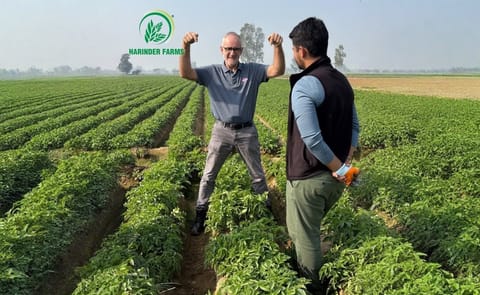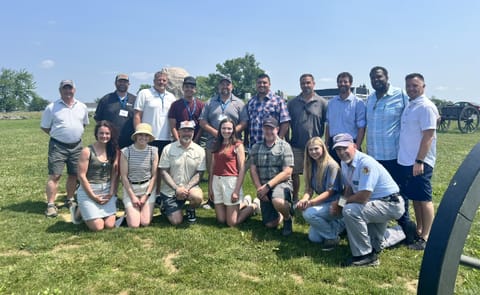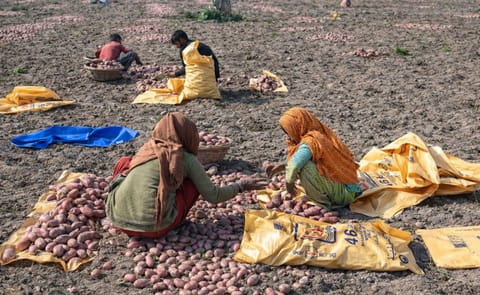University of Minnesota potato researcher Laura Shannon addresses potato farmers at the Northern Plains Potato Growers Association's Thursday, Aug. 26, field day at Hoverson Farms near Larimore, North Dakota.
(Ann Bailey/Grand Forks Herald)
Heat, drought stress Red River Valley potato crop, resulting in quality, yield reduction of table stock

The toll that hot dry weather took on the Red River Valley 2021 potato crop won’t be visible until harvest begins in a few weeks, but it’s already clear it has affected yields and quality.
Gary Secor, North Dakota State University plant pathologist:
"We have a lot of physiological disorders."Secor was one of several NDSU and University of Minnesota researchers who spoke on Thursday, Aug. 26, at the Northern Plains Potato Growers Association field day near Larimore, North Dakota.
Meanwhile, the drought has reduced yields of red potatoes grown for the fresh market. Growers hope, though, that recent rains will add weight to the crop and make digging easier. About 200 farmers attended the first leg of the field day potato tour at Hoverson Farms near Larimore to hear the potato researchers give information about the crop.
After the morning presentations, the field day tour moved to the Northern Plains Potato Growers Association’s irrigated research site near Inkster, North Dakota, and in the evening, to Oberg Farms, near Hoople, North Dakota.
The Red River Valley is the largest producer of red potatoes in the United States, and North Dakota and Minnesota combined is the third largest potato growing region in the country. Potato farmers in the Northern Plains raise about 62% of potatoes for fry processing, 10% for seed, 12% for chipping and 16% for the fresh market, according to the Northern Plains Potato Growers Association.
The condition of North Dakota potatoes, which includes processing and fresh stock, in the week that ended Sunday, Aug. 23, was 8% very poor, 14% poor and 63% fair, according to National Agricultural Statistics-North Dakota. The agency rated only 13% of the crop good, and 2% excellent.
In Minnesota, where 20% of the potatoes had been harvested as of Aug. 23, 61% of the crop was rated good to excellent, National Agricultural Statistic Service-Minnesota said. Besides the Red River Valley, the state's potatoes are grown in the Elk River and Park Rapids areas of Minnesota and near Albert Lea.
The upside of the heat and dry conditions during the 2021 growing season is that the Red River Valley potato crop was virtually free of disease.
For example, late blight, a potato disease that damages foliage and tubers, didn’t appear in the crop this year. During wet years, farmers have to be vigilant about monitoring their potato fields and apply fungicide if they detect late blight, a disease that has potential to cause devastating yield losses.
Though some northeast North Dakota and northwest Minnesota potato fields recently have received rain, late blight won’t become an issue because there is no inoculant to blow around. However, physiological disorders are a potential quality issue.
Hot temperatures during the growing season have resulted in the disorders, which include internal heat necrosis and hollow heart.
The two physiological disorders don’t affect the safety of the potato, but consumers generally don’t like to eat potatoes with the brown spots on the interior of the potato, which is characteristic of internal heat necrosis, or potatoes that contain the black spots, which is a symptom of hollow heart.
The unattractive appearance of the potatoes’ interior can result in the reduction of repeat sales. The effect on yields is uncertain. Harvest of the potatoes will begin in about two weeks.
So far, the crop of Hoverson Farms, which hosted the Northern Plains Potato Growers Association field day Thursday, looks good, but the tubers under the plants need to increase in size, said Carl Hoverson, who owns the farm with his sons, Mike and Casey.
Under irrigation, Hoverson Farms grows about 5,400 acres of potatoes for the processing, chipping and table stock market. Hoverson Farms will begin harvesting potatoes on Sept. 10, weather permitting, and hopes for an average yield of 475 hundred-pound bags per acre, Carl Hoverson said.
Harvest of red potatoes, grown for the fresh market, will begin mid-September, said Donavon Johnson, Northern Plains Potato Growers Association president. Johnson estimates that yields of the red potatoes, most of which are grown without irrigation, will be average. Good red potato yields would be from 325 to 375 hundredweight, he said.

Several varieties of potatoes in many sizes line a table at the Northern Plains Potato Growers field day on Thursday, Aug. 26, at Hoverson Farms in Larimore, N.D. (Ann Bailey/Grand Forks Herald)
Like to receive news like this by email? Join and Subscribe!
Get the latest potato industry news straight to your WhatsApp. Join the PotatoPro WhatsApp Community!
Highlighted Company
Sponsored Content
Sponsored Content
Sponsored Content
Sponsored Content












